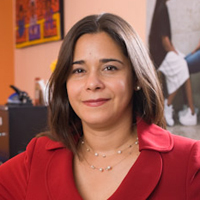
Luz Herrera
Federally funded legal aid is free, and that needs to change, says Luz E. Herrera, a Harvard Law grad who focuses on access-to-justice issues for low- and moderate-income people.
Federally funded legal aid is free, and that needs to change, says Luz E. Herrera, a Harvard Law grad who focuses on access-to-justice issues for low- and moderate-income people.She allows that those with incomes at the bottom of federal poverty guidelines often can’t afford to pay anything and shouldn’t have to. And for some issues, like domestic violence, she says there should never be a fee. But Herrera believes that in many practice areas, clients would appreciate the choices they’d get by paying something—and that it’s patronizing to assume they can pay nothing.
“The answer is not $300 an hour, but it’s also not $0,” says Herrera, an assistant professor at San Diego’s Thomas Jefferson School of Law. “We can’t look at providing legal services to the poor and assume they’ll always be poor. The current legal aid model is for people who really need help and assumes that’s all there is.”
Herrera’s idea about charging something isn’t well-received by some legal aid advocates, which she finds surprising.
“I think pro bono actually haunts us,” says Herrera, 36. “It minimizes the representation of the legal profession to an aspirational 50 hours a year.”
A former sole practitioner, Herrera is developing a community-based legal clinic for low- and moderate-income clients. And in 2005 she founded Community Lawyers Inc., a Compton, Calif., nonprofit that helps attorneys and paralegals serve low- and moderate-income clients. She pays out of pocket the office’s $1,200 monthly rent.
“It’s hard,” she says, “but I believe in it.”
Hear Herrera talk about her clinic and working with students.
Herrera doesn’t expect all her students to do legal aid work, but she does hope the clinic experience will give them a strong understanding of access-to-justice issues. And she hopes they will use that knowledge in whatever capacity they can.
After a brief, not-so-pleasant experience as a real estate associate at San Francisco’s Heller Ehrman, Herrera opened a storefront law office in Compton in 2002. She says she was the only full-time, Spanish-speaking lawyer in the southern Los Angeles suburb, which has a median household income of only $32,000.
She charged flat fees in some cases; in others, her hourly rate was $150. Consultations were $75. The first year Herrera earned $26,000 and lived with her parents at their home in Whittier.
Many lawyers dream of opening a storefront office in an underserved neighborhood, and that Herrera actually did it doesn’t surprise some who know her.
“It was very Luz-like,” says her friend Wendelyn Killian. The two met as undergraduates at Stanford University and attended Harvard Law School together. “She’s seen people of color get the short end of the stick, and she wanted to try and fill that void in any way she can,” says Killian, development director at the Community Coalition in Los Angeles. “She also wants financial security, like all of us.”
An only child of Mexican immigrants, Herrera says she has never been poor “because we always worked a hundred jobs.”
“Sometimes when she’s really fixed on what she wants to do, you might misread how flexible she can be—and open to ideas,” says Jeanne Charn, director of Harvard Law School’s Bellow-Sacks Access to Civil Legal Services Project.
Herrera received an alumni award named after Gary Bellow, Charn’s late husband who directed the school’s clinical law programs. Charn was so impressed that, when Herrera was selected for a one-year fellowship at the school’s Community Enterprise Project in 2006, she invited Herrera to live with her.
“You can sort out the people who kind of have a grip on life, deal with their mistakes, and own up to what they should do,” Charn says. “She’s just one of those people.”
Herrera’s accent is one common among people who, like herself, grew up in Los Angeles’ Spanish-speaking communities. She’s a petite woman who often pairs conservative business-casual wear with unique necklaces.
She closed her practice in December 2008 because it was difficult to provide direct legal services and advocate on issues close to her heart.
And Herrera wanted to encourage more lawyers to practice in underserved communities.
“I felt I needed to step out of the role for others to step into it,” she says. “If it was just about me and my practice, that was never enough.”